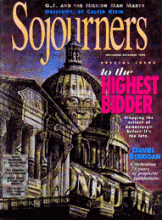Voting with their feet, tens of millions of Americans are taking a walk on present-day politics. Fewer than half of potential voters are registered and fewer than half of those who are registered actually vote, despite the hundreds of millions of dollars candidates spend each election cycle urging them to do so. This decline in participation and the corresponding upturn in disillusionment with government has been amply documented. But this is not the whole story.
Everywhere we look, people are moving, not in the same direction and certainly not all in directions with which we agree. But, most assuredly, they are in motion-in fact, radical motion. Major organizing efforts by unions and community organizations to support exploited workers fighting for a livable wage are under way in many cities. Many people have become personally involved in the increasingly political battles against AIDS and breast cancer. Almost 20 percent of those voting supported an independent candidate for president in 1992 after hundreds of thousands helped to put his name on the ballot in all 50 states.
Term limits have passed in 23 states, winning in every state where voters have been offered ballot measures. Activists of the Left, Right, and Center are mounting what could be the most successful efforts in this century to expand beyond the two-party duopoly by forming new parties and fighting archaic and unfair ballot-access laws. Such activity contradicts the commonly held notion that the public is apathetic.
Consensus for reform of our political system cuts across all ideological divides. In many states, there is new momentum to change the laws governing money in politics. This may well catalyze the ultimate in "strange bedfellow" coalitions.
For example, so popular was the issue at the August 1995 United We Stand convention in Dallas, two related panels had to be run several times to accommodate the more than 60 percent of delegates who signed up to attend.
Read the Full Article

